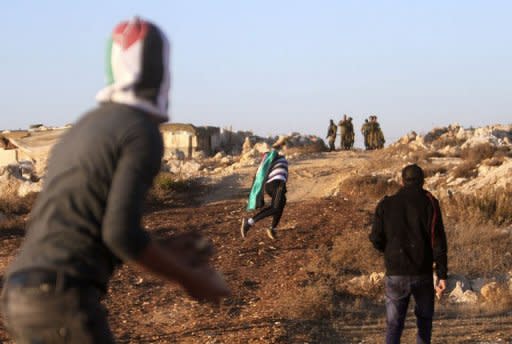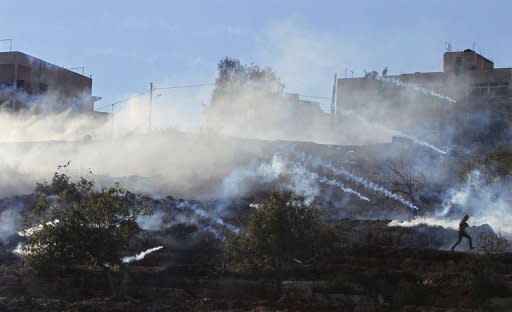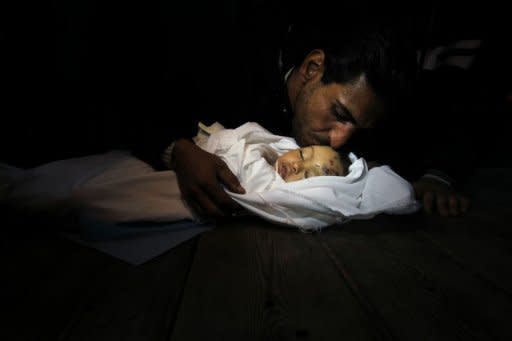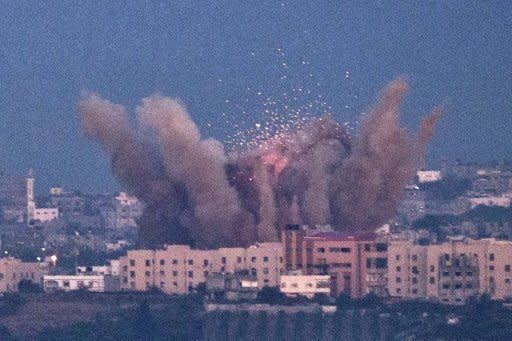Israel presses Gaza assault as rocket panics Tel Aviv
Israel gave the go-ahead to call up 30,000 reservists and warned it was ready to expand its offensive in the Gaza Strip after militants targeted Tel Aviv with rockets for the first time since the 1991 Gulf War. The militants defied a major Israeli bombing campaign across Gaza on Thursday, firing off volleys of rockets which killed three Israelis and sparked panic in Tel Aviv. As Palestinian deaths from relentless air strikes rose to 16, Defence Minister Ehud Barak gave the all-clear for 30,000 reservists to be called up, with the army saying it was "in the process of expanding the campaign." Among 11 Palestinians killed on Thursday were five militants, two children and a teacher at a United Nations-run school, medics and a UN official said. Two brothers were among the other three dead. In a surprise move, Egypt announced that Prime Minister Hisham Qandil would visit Gaza on Friday, as Washington urged Cairo to use its influence to try to halt the violence. But Gaza's ruling Hamas movement remained defiant, ruling out talk of a truce even as Israeli Prime Minister Benjamin Netanyahu warned he was ready to "significantly expand" the campaign, codenamed Operation Pillar of Defence. "In the past 24 hours, Israel has made it clear that it will not tolerate rocket and missile attacks on its civilians. I hope that Hamas and the other terror organisations in Gaza got the message," he said after three Israelis were killed and 19 wounded as rockets pounded the south. "If not, Israel is prepared to take whatever action is necessary to defend our people." Shortly afterwards, a rocket hit the sea just south of Tel Aviv, the farthest distance ever attained by fire from Gaza. The attack was claimed by the armed wing of Islamic Jihad, which said it had launched an Iranian-made Fajr 5 rocket at the sprawling coastal city. As sirens wailed across Tel Aviv, television images showed people running for cover as others lay on the ground outside the defence ministry, their hands over their heads. Israeli news networks said it was the first time rockets had been fired at Tel Aviv since the 1991 Gulf War, when the city was hit by Iraqi Scud missiles. "The firing towards Gush Dan and the extent of the general (rocket) fire toward Israel is an escalation," Barak said in a statement. "This escalation will have a price that the other side will have to pay," he warned after approving a military request for the call-up of 30,000 reservists. Senior cabinet minister Moshe Yaalon warned on his official Twitter account that Israel was considering all options, "including the possibility that forces will be ready to enter Gaza in the event that the firing doesn't stop." "Whoever continues attacking us, his blood will be on his own head." Defiant Hamas spokesman Sami Abu Zuhri said any "talk of a truce... (was) an attempt to provide more cover for a continuation of the escalation." As night fell on Gaza City, the aerial bombardment resumed in earnest, with loud explosions ringing out across the city, and others reported in the southern city of Rafah and Beit Hanun in the north. The Israeli military said in a statement it had targeted around 70 rocket-launching sites in the space of an hour. With much of Gaza in darkness because of scheduled power outages, the streets were almost empty, with just a few people out stocking up on food and medicine as the confrontation showed no sign of ending. Also on Thursday, Hamas militants said they had hit an Israeli drone with a surface-to-air missile east of Gaza City, a claim dismissed by the army. Israel's biggest military campaign against Gaza in nearly four years began on Wednesday with the targeted killing of Hamas commander Ahmed Jaabari, triggering a major flare-up in and around the tiny enclave where 1.6 million Palestinians live. Israel's military says it has hit at least "225 targets" in Gaza, as militants fired more than 380 rockets, 274 of which hit southern Israel and another 112 of which were intercepted by the Iron Dome anti-missile system. The violence, as Israel heads towards a January general election, sparked deep concern internationally and prompted an emergency meeting of the UN Security Council. Israel's offensive prompted an outpouring of anger across the Arab and Muslim world, with Tehran accusing the Jewish state of "organised terrorism" and Qatar's premier saying the strikes "must not pass unpunished." But Middle East envoy Tony Blair urged Hamas to stop targeting Israeli towns, warning that "the retaliation will increase." And the White House said there was "no justification" for rocket attacks on Israel, blaming Hamas for the explosion of violence.





